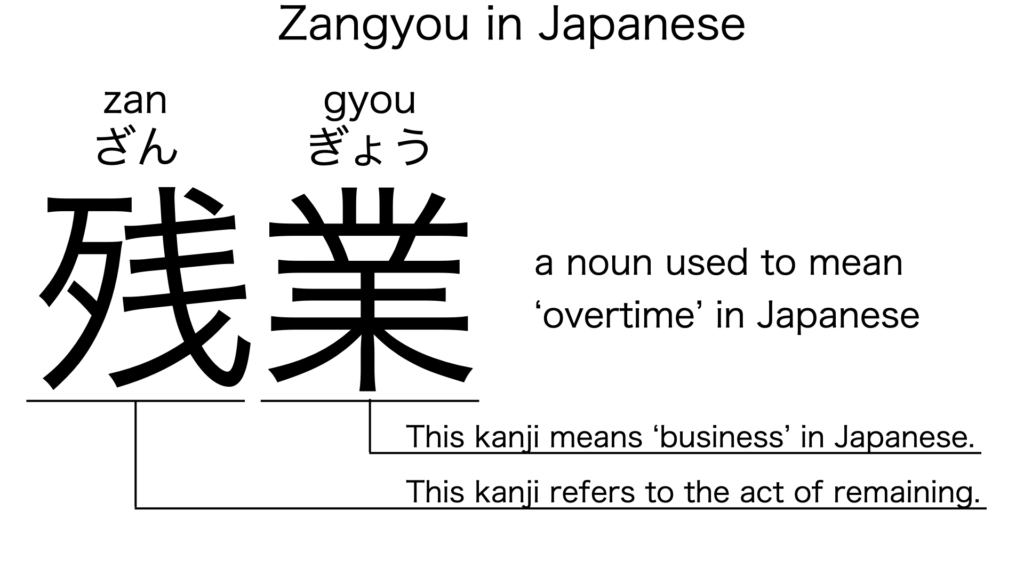What does “zangyou” mean in Japanese?
Native speakers use zangyou to mean ‘overtime’ in Japanese. Perhaps, some Japanese learners know this word as it is sometimes used in Japanese conversations. In this blog post, however, I’m explaining this word in detail based on its kanji expression. And also, I’m explaining how to use it through example sentences. My explanations would help Japanese learners understand zangyou more clearly. Then, let’s get started!
Contents
Definition and meanings of “zangyou”
Let me start with the definition and meanings of zangyou.
- zangyou – 残業 (ざんぎょう) : a noun used to mean ‘overtime’ or ‘extra work’ in Japanese.
The definition and meanings are simple and clear. To understand this noun more clearly, however, let me explain its kanji characters in detail, one by one.
Zangyou in kanji
The kanji expression of zangyou consists of the following two kanji characters:
- 残 : a kanji character used to refer to the act of remaining.
- 業 : a kanji character often used to mean ‘business’ in Japanese.
From these two kanji characters, we can understand that zangyou literally means ‘remaining business’ in Japanese. This literal interpretation is not completely in line with the actual meanings, but still understandable, I think. Overtime is often required to do some remaining work.

When we meet new kanji expressions, we should check their kanji characters in detail to understand their meanings clearly and deeply. In many cases, kanji characters tell us a lot about the meanings of the expressions they form. Actually, here, we could get the better understanding of zangyou through the detailed kanji check above.
So far, I’ve explained the definition and meanings of zangyou together with its kanji characters. Then, let me explain how to use it through the example sentences below.
How to say “overtime” in Japanese
kanojo wa itsumo zangyou wo shi masu – 彼女はいつも残業をします (かのじょはいつもざんぎょうをします)
She always works overtime.
Below are the new words used in the example sentence.
- kanojo – 彼女 (かのじょ) : a pronoun used to mean ‘she’ in Japanese.
- wa – は : a binding particle working as a case marker or topic marker. In the example, this works after kanojo to make the subject in the sentence.
- itsumo – いつも : an adverb of frequency used to mean ‘always’ in Japanese.
- wo – を : a case particle used to make the object word in a sentence. In the example, this is used after zangyou to make the object in the sentence.
- shi – し : one conjugation of the verb, suru, which means ‘to do’, ‘to perform’, or such in Japanese. In the example, it has been conjugated for the better connection with its following word.
- masu – ます : an auxiliary verb used after a verb to make it polite. Probably, this is well known as a part of the Japanese masu form. In the example, this is used after shi to make it sound polite.
This is a typical usage of zangyou. In this example, it works in the commonly-used phrase, zangyou wo shi masu, which means ‘to work overtime’ in Japanese. This phrase should not be commonly used, though.
Another example of “zangyou”
kanojo no imouto mo mainichi zangyou wo shi masu – 彼女の妹も毎日残業をします (かのじょのいもうともまいにちざんぎょうをします)
Her little sister works overtime every day, too.
Below are the new words used in the example sentence.
- no – の : a case particle used after a noun or pronoun to make its possessive case. In the example, this is used after kanojo to make its possessive case, kanojo no, which means ‘her’ in Japanese.
- imouto – 妹 (いもうと) : a noun used to mean a ‘little sister’ in Japanese. This can also work as plural. Learn more about Japanese plural.
- mo – も : a binding particle making the subject word or the object word in a sentence with adding the meaning of ‘too’, ‘also’, or ‘as well’ in Japanese. In the example, this works after kanojo no imouto to make the subject in the sentence with adding the meaning of ‘too’.
- mainichi – 毎日 (まいにち) : an adverb used to mean ‘every day’ in Japanese.
This is another example of zangyou. When we want to mean ‘overtime’ in Japanese, this noun is always a very good option.
Summary
In this blog post, I’ve explained the definition and meanings of zangyou in detail based on its kanji expression. And also, I’ve explained how to use it through the example sentences. Let me summarize them as follows.
- zangyou – 残業 (ざんぎょう) : a noun used to mean ‘overtime’ or ‘extra work’ in Japanese. These two kanji characters literally mean ‘remaining business’ in Japanese. This literal interpretation is not completely in line with the actual meanings, but still understandable, I think. Overtime is often required to do some remaining work.
Hope my explanations are understandable and helpful for Japanese learners.
Leave a Reply